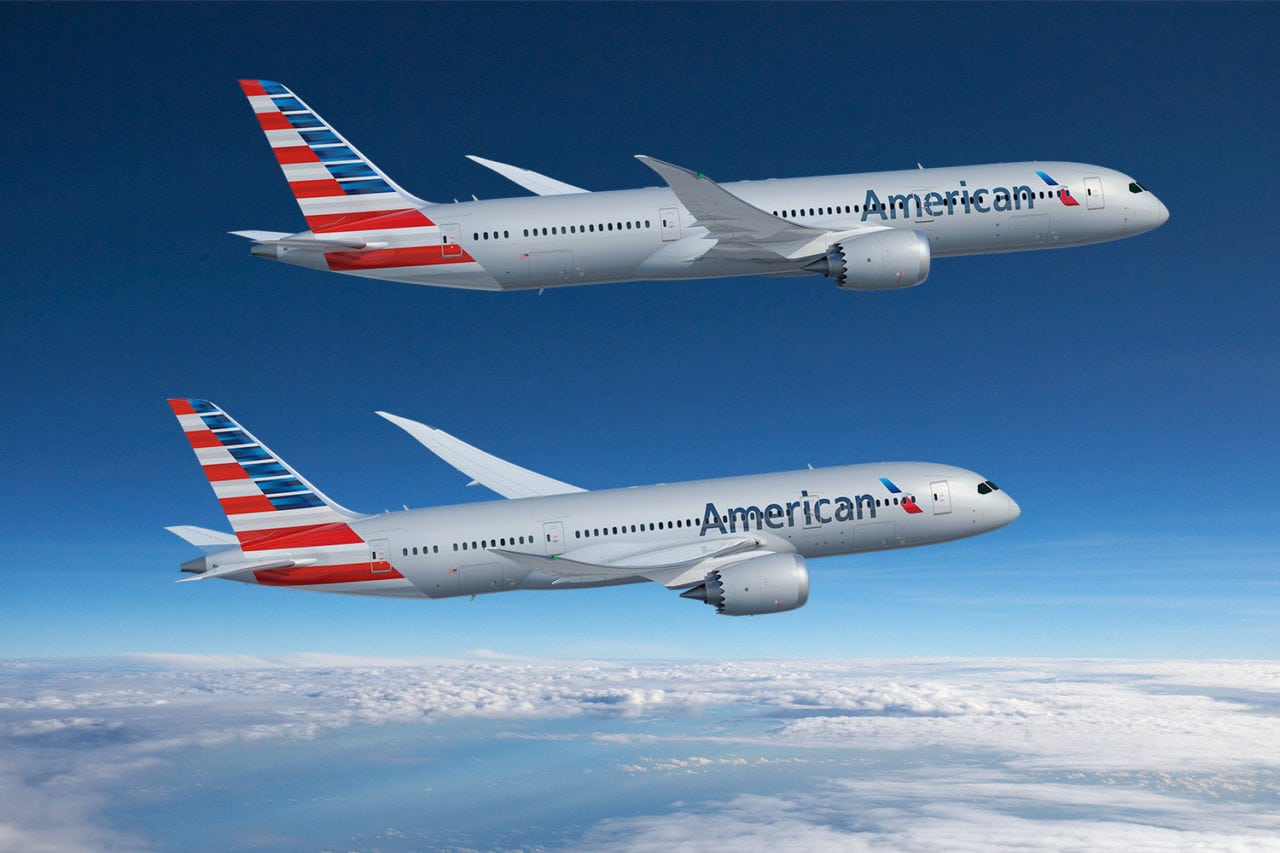
Two Boeing 787 Dreamliners bearing the American Airlines livery. (PRNewsfoto/Boeing)
Boeing earned $101.1 billion in 2018, an 8 percent year-over-year growth and a new high mark for the planemaker. The company saw moderate gains in every major segment contribute to the total, with the most growth seen in the smaller defense and services businesses.
In particular, Boeing pushed for a strong finish to the year; high-volume commercial deliveries and stronger performance of its global services division drove the company to year-over-year (YOY) revenue growth of 14 percent and generally accepted accounting principals (GAAP) earnings from operations growth of 40 percent in the fourth quarter. Notably, this is despite a comparison to a 2017 in which the company benefited from President Trump’s corporate tax breaks.
“Our financial performance provided a firm platform to further invest in new growth businesses, innovation and future franchise programs, as well as in our people and enabling technologies,” said Boeing head Dennis Muilenburg. “In the last five years, we have invested nearly $35 billion in key strategic areas of our business, all while increasing cash returns to shareholders.”

Boeing Chairman, CEO and President Dennis Muilenburg. (Boeing)
“Our ‘One Boeing’ focus, clear strategies for growth, and leading positions in large and growing markets give us confidence for continued strong performance, revenue expansion and solid execution across all three businesses, which is reflected in our 2019 guidance.”
Boeing’s commercial business, which accounts for well over half of the Seattle manufacturer’s revenue, saw a 5 percent year-over-year (YOY) increase, to $60.7 billion. Bolstered by a strong fourth quarter in which it delivered 239 planes valued at $17.3 billion — up 14 percent and 12 percent, respectively, from last year’s fourth quarter — Boeing set an industry record with 806 aircraft delivered in 2018.
That figure puts it six deliveries ahead of rival Airbus for the year, provided Boeing includes 10 767s that are being shuffled from one arm of the company to the other for planned KC-46 tanker conversion. Boeing also bested its European competitor in net order intake, 893 to 747, though Airbus is still the king of backlog, topping Boeing’s 5,873 aircraft by 1,700. Boeing sets the value of its backlog at $490 billion.
Looking forward, Boeing will work to establish itself more in China, where the company set up a “737 completion and delivery center” in 2018 to support Asian deliveries of the 737 MAX family. Currently, about one-third of 737 MAX orders are destined for China, and Boeing predicts the country will need nearly 8,000 new commercial aircraft over the next two decades.
Boeing’s Defense, Space and Security business continues to grow. The company delivered two satellites this year, one military and one civil, and has upped its volume on F/A-18 Hornets. One of the significant projects for the company is the KC-46 tanker, which has experienced a host of delays, but finally began deliveries to the U.S. Air Force this month. Muilenburg said on the company’s earnings call that the Air Force has accepted two more tankers, which will be delivered “imminently.”
Boeing’s Defense segment saw growth of 13 percent YOY, from $20.6 billion in 2017 to $23.2 billion in 2018. The group’s operating margin saw a particular jump, up 3.8 points from 6.9 percent in 2017 to 10.7 percent in 2018.
The group’s backlog is at $57 billion, the company reports, with a 70-30 split between domestic and international customers.
Boeing’s fledgling Global Services division saw 17 percent YOY growth, from $14.6 billion to $17 billion, bolstered by a fourth quarter in which the acquisition of parts distributor KLX helped the segment achieve revenue increases of 29 percent YOY.
Boeing announced the $4.3 billion KLX acquisition last May as part of an effort to grow its services segment to a $50 billion business by 2027. To the same end, Boeing teamed up with Safran in a partnership focused on engine auxiliary power units. Boeing’s Global Services backlog is $21 billion.
In 2019, Boeing expects to again steadily and generally improve its figures across all three key segments.
The company’s guidance predicts between $109.5 billion and $111.5 billion in revenue, which would mean 8.3 percent to 10.3 percent YOY growth. Boeing’s guidance includes approximately $5 billion more in commercial aircraft sales next year despite delivering fewer aircraft, notably. The company expects its defense business to grow at a similar rate to this year, though its services segment shows very little growth in the company’s guidance — despite Boeing’s aggressive 10-year plan for Boeing Global Services. Additional acquisitions or partnerships might be the way the company expects significant alterations to manifest.
A big item to keep an eye on for Boeing in 2019 will be its joint venture with Embraer. Originally announced last July as a way for Boeing to take over 80 percent of Embraer’s commercial business after Airbus got Bombardier’s C-class jets, the approvals have been slow to come. In December, the approximately $4 billion deal was blocked by a Brazillian judge, whose ruling was then overturned by the country’s new government. The companies are trying to work together on both commercial business and limited military business including the KC-390, but the agreements have to meet approval in multiple courts before they can be finalized.